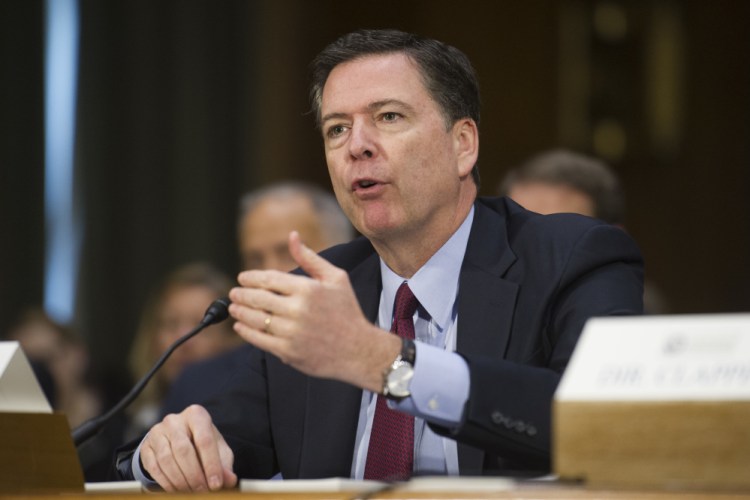WASHINGTON — The Justice Department’s internal watchdog said Thursday it will investigate FBI Director James Comey’s decision to publicly release information about the bureau’s investigation into Hillary Clinton’s handling of classified material.
The inquiry by the Justice Department’s inspector general will focus on whether “policies or procedures were not followed” when Comey held a July 5 news conference to discuss the case and when he sent letters to Congress just before the election that disclosed his agents were reviewing newly discovered emails pertinent to the Clinton case.
Inspector General Michael E. Horowitz said in a statement that the probe was spurred by “numerous” requests for his office to examine the matter.
Some in Clinton’s campaign blamed Comey’s actions for halting her momentum shortly before the election and helping in Donald Trump’s presidential victory.
His office also will investigate whether the FBI and Justice Department improperly disclosed information that should have remained private. And it will delve into why the FBI published days before the election 15-year-old reports of agents’ investigation into then-President Bill Clinton’s pardon of fugitive financier Marc Rich, the inspector general said in a news release.
Comey held a conference July 5 to announce that he and his agents were recommending that the Justice Department not seek charges against Clinton related to her use of a private email server during her time as secretary of state. The FBI concluded that Clinton and her aides shared classified information over the server, but Comey said agents found no evidence that they had intended to do so, a key element of a potential prosecution.
The case seemed to be dead until Oct. 28 when Comey sent a letter to Congress informing lawmakers his agents were reviewing newly discovered emails potentially linked to the Clinton investigation. Those emails were discovered on the computer belonging to former Rep. Anthony Weiner, the husband of Clinton’s close aide, Huma Abedin.
The FBI was investigating allegations that Weiner may have violated federal laws while exchanging sexually explicit texts with a 15-year-old girl in North Carolina. The FBI obtained a warrant to examine the Clinton-related emails on the computer. Just days before the Nov. 8 election, Comey sent a second letter to Congress saying nothing discovered during the examination of the computer caused them to change their original assessment.
Comey’s decision to hold a news conference and issue letters appeared to violate Justice Department guidelines prohibiting the release of information about investigations, especially those that might influence an election. His public disclosures were sharply criticized by Democrats and former high-ranking Justice Department officials.
Send questions/comments to the editors.


